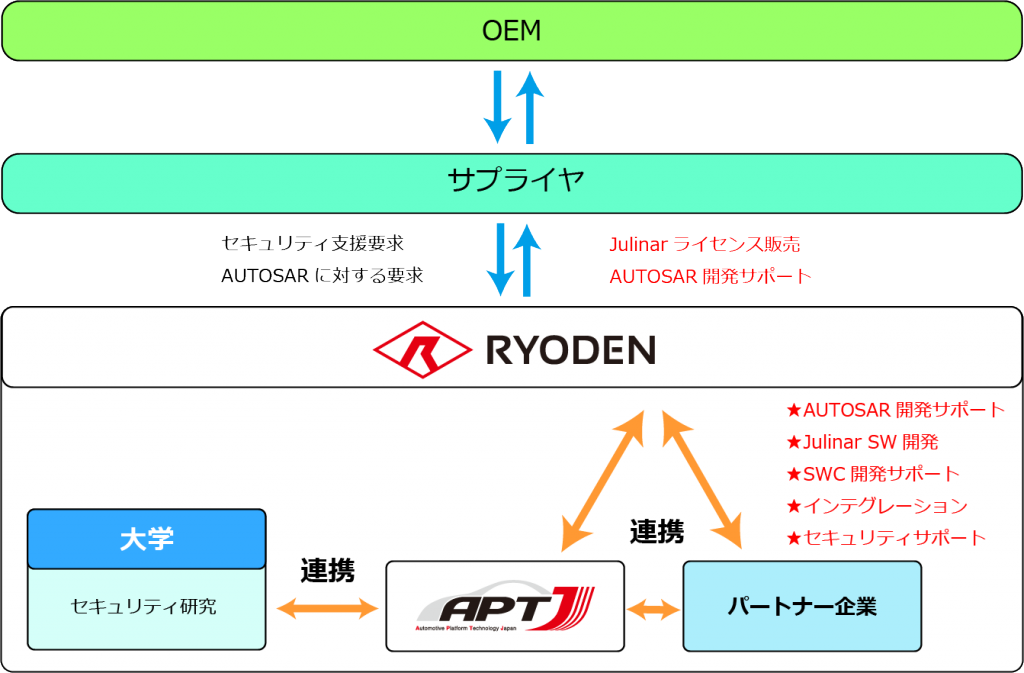- HOME >
- Electronics Business >
- AUTOSAR Embedded Software Solution for Automobiles
Electronics Business
AUTOSAR Embedded Software Solution for Automobiles
Supporting Quality and Efficiency in Vehicle-mounted ECUs
Today the automotive industry is making rapid progress in the development of “Connected, Autonomous, Shared & Services, Electric” (CASE) technologies.
One component strongly impacted by this progress is the electronic control unit (ECU), which controls the systems and software embedded in automobiles. These controls are growing in complexity and scale, while the number of ECUs incorporated in each vehicle is rising dramatically. As this trend escalates, manufacturers face considerable challenges, as quality declines and development worker-hours increase.
Ryoden addresses these issues with two solutions: Standardization of software, via AUTOSAR; and streamlining of the evaluation process, using virtual environments.
AUTOSAR
Automotive Open System Architecture (AUTOSAR) is an association of primarily European automakers created for the purpose of standardizing the software used in vehicles. AUTOSAR establishes the standard specifications implemented in each AUTOSAR software platform (AUTOSAR SPF).
An AUTOSAR SPF is a software platform that conforms to the specifications agreed by AUTOSAR.
By standardizing their software through an AUTOSAR SPF, automakers can improve the reusability of their applications and introduce new features and technologies with ease. ECUs can thus be changed, upgraded and ported to other systems more easily than ever, enabling dramatic improvements in development efficiency.
To offer solutions that match the needs of its customers in Japan, Ryoden proposes two made-in-Japan AUTOSAR SPFs: Julinar from APTJ Co., Ltd., and CioRy, from Sunny Giken Inc.
License Sales
Ryoden proposes two made-in-Japan AUTOSAR SPFs:
Julinar (from APTJ)
AUTOSAR platform based on AUTOSAR R4.2.2 (and partially on R4.3.x)
CioRy (from Sunny Giken)
High-speed, compact basic software (BSW)2 based on AUTOSAR and designed for low-end microcontroller units (MCUs)
As shown in the figure at right, Ryoden uses Julinar, an AUTOSAR SPF, and CioRy, a small BSW specialized for communications (CAN/LIN) in low-end MCUs, to propose scalable solutions according to the needs of each customer.
Development Tools
AUTOSAR authoring tools
Ryoden offers development tools to make AUTOSAR development proceed more efficiently, from modeling systems and architectures based on AUTOSAR to generation of virtual ECUs.
Integrated development environments for embedded systems
Ryoden supplies integrated development environments optimized for each company’s microcontrollers. Consisting of tools such as a compiler, builder, editor and debugger, an integrated development environment provides a wide range of features to shorten development lead time and improve program performance and quality.
Evaluation Environments
VLAB Virtual Platform, an AUTOSAR evaluation environment that uses virtual ECUs
VLAB Virtual Platform enables the creation of a virtual (simulated) environment that mimics a real ECU system.
Software developed in the virtual environment can be installed and debugged in the AUTOSAR SPF (Julinar, CioRy) on a PC before the actual microcontroller or ECU is obtained, enabling software evaluation to be completed early. Using Ryoden’s unique automotive failure injection testing tool, customers can reduce evaluation time and test hardware abnormalities with the aim of conforming to ISO 26262, “road vehicles—functional safety.”
Support Frameworks
In collaboration with its partner companies, Ryoden provides:
• Integration support
• Custom support for OEMs
• SW-C development support for AUTOSAR
• Support for introduction of AUTOSAR
And others. Please feel free to consult with us.
AUTOSAR support
Dedicated engineers assist you from AUTOSAR introduction to technical support.
1) Support for AUTOSAR introduction and maintenance
Introductory AUTOSAR service
For customers who are introducing Julinar or CioRy, Ryoden explains the basics of AUTOSAR and techniques for embedding it in ECUs.
Troubleshooting of problems arising from AUTOSAR introduction
This is a service to analyze failures that can arise in customer ECUs in which Julinar or CioRy is installed.
2) Support for development of AUTOSAR software components
Software component support service
This service supports customers in creating their own software components and complex device drivers.
Combined component testing service
This service tests the features of combined components integrated by customers.
3) Custom support for OEMs
Custom service for Julinar with customer specifications
This service implements additions and modifications to customer specifications based on Julinar or CioRy BSW, RTEs and MCALs.
MCU porting service
This service ports Julinar and CioRy BSW, run-time environments (RTEs) and microcontroller abstraction layers (MCALs) to an MCU specified by the customer.
4) Integration
Integration service
This service coordinates almost 80 modules and over 1,000 parameters to create combined components that ideally match customer requirements. In building the combined components, Ryoden considers the use of definition information from upper-level tools and signal definition files such as CANdb.
Integration technical support service
When customers integrate Julinar or CioRy BSW, RTEs or MCALs themselves, Ryoden provides their engineers with technical support.
Example of APTJ Julinar support
In collaboration with APTJ and other partner companies, Ryoden supports AUTOSAR implementation from stage 1, AUTOSAR implementation and maintenance, to stage 4, integration.
Ryoden also provides security support, in partnership with universities steeped in knowledge of security matters,
 Electronics Business
Electronics Business
Electronics Business
■Electronics Business
- Semiconductors
- AUTOSAR Embedded Software Solution for Automobiles
- Embedded Software Solutions for the Automotive Industry: Virtual Environments
- Communication Equipment and Modules
- Display Devices
- Optical devices
- Circuit Boards
- Finished Metal Products
- Metals
- Coils and Transformers
- High-frequency Parts
- Connectors and Sockets
- Capacitors
- Plastics and Finished Products
- Liquid Crystal Oscillators
- Sensors
- Textile products
- Equipment
- Cast and wrought products
- Resistors
- Power Sources and Batteries
- Power Sources, Cables and Heaters
- Chemical Products
- Fuses
- Filters
- Secondary Materials
- Motors
- Other Electrical and Electronic Parts
- Other















